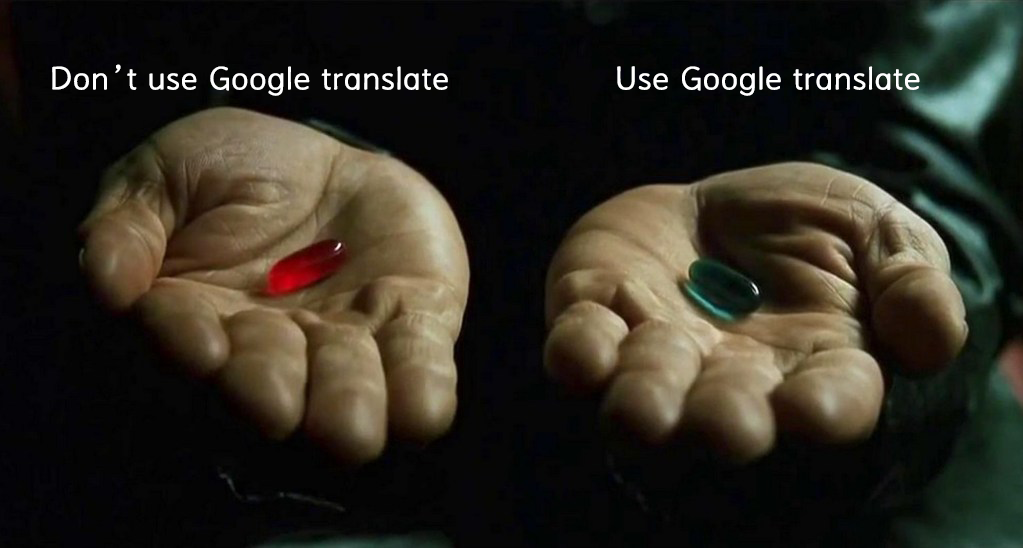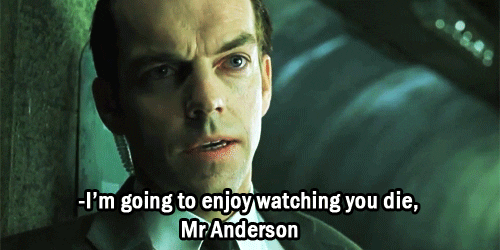6 reasons to stop using AI translation tools
Alright, so let’s roll up our sleeves and get down to the nitty-gritty because this is a serious topic: AI.
As a professional translator, I can see AI services benefit from an increasing and creepy clout in the industry and I receive a lot of emails from companies offering me jobs to translate, transcribe and record documents, sentences or dialogues into French, using only AI tools and thus, contributing to its development.

Let’s just be clear: when we talk about professional translations, I just love the red pill and my attitude will always remain the same.
I’m getting tired of hearing about AI development. I think it’s dangerous for the industry and here are some reasons why you, too, should be wary of it.
1 – AI is creepy
You got that right. AI is creepy. But first, what does AI mean ? To begin with, it means “Artificial Intelligence”.
As a result, AI means people will consider they won’t need humans in the future to do some research or think for themselves, and the mere development of the AI industry contributes in itself to the loss of human interaction or work. That’s it, full stop. Need I say more ? Well, given the naivety of certain people around me, I’m afraid I do. So let me rephrase this in terms that you may fully understand.
In the Western world, AI means companies like Google, Apple or Amazon, but in China, Tencent (via Wechat) or Alibaba. This entails that they will increase their monopoly. From now on, I’ll mostly talk about Google, although those other behemoths are concerned too. AI means unification of knowledge around one single entity. This means it could lead to potential dictatorship once they have a stranglehold on all the major data of the world wide web – and we’re almost there. So, once you’re considered as irrelevant (i.e. in a Google search, say for SEO purposes) or seen as reluctant to obey to the new normal ideals or rules, who knows what may happen to your internet access, brand image or your data.
In China, they’ve already got social credit number been implemented. Whereas most suck up to the state institutions since they have no other choice – well, it’s either that or your social credit number goes down, duh -, some voices raise concern over freedom of choice. There is no denying freedom of speech has already been flouted for a long time there. Not to mention that in the West, we suffered the same blow last winter with the censorship that occured via Twitter. Same shit, different country… I don’t mean to pinpoint which country’s best here though. Each country can do better in its own way.
But let’s get back to China for a minute. In case you disagree with some policies that may be enforced, act like a bad citizen, make bad choices or even just jaywalk too much – nobody is perfect and seriously, it might happen to the best of us -, you might reap the benefits of a C minus and end up being barred from trains, buses or any other means of transportation.
This is what happened to a Chinese person who was interviewed in a short documentary I watched not so long ago, and I truly wonder who would like this to happen to them… I truly pity the guy sanctioned by such authoritative measures.
This may have sounded like a movie-like dystopian future around 2000, but this is what is happening right now! Personally, I think China has a leg up regarding technological development. Watching what happens in this country is a great opportunity for us Westerners to see what may occur here in the near future.
Quite creepy, ain’t it? But seems like Agent Smith doesn’t care…

2 – AI may potentially destroy your job
There is no denying AI is expanding by leaps and bounds and it might be here for the long run. Unfortunately, humans tend to adapt rather quickly when a technological comfort makes it easier for us to live, understandably, because we’re all a bit lazy. Why bother getting up, picking a dictionary and doing all the research when Google translate has all the answers in a single click?
How could I blame you? Even though I try not to, I even do it at times!
It’s a dramatic time-saving habit enabling us to translate chunks of texts that would have taken more time to translate. Lazyness is quite something, right ?!
However, we ought to realise that despite of all its privacy concerns – which are relevant, but I won’t enter into further details here – AI is detrimental for the translation industry on several aspects.
For starters, it provides free services that do not ensure quality translations. Even though Google translation – or any other AI translation tool – has dramatically improved over the last few years, there’s still a lot to be done.
I have also found myself in situations where I had to retranslate a document whereas I was just supposed to proofread it – or as they call it, perform a MTPE. A lot of translation agencies rely on free translation tools to create sentences that make no sense whatsoever – and then call a professional translator claiming the project is all about proofreading just to get a bang for their buck.
Well, most freelance translators know how it goes. But let me sum it up for you with in an orderly fashion:
- A company uses a free AI translation service.
- A bad translation is done – pretty obvious so far.
- The same company calls a translator to fix it using low rates because they claim it’s only a proofreading job – since the translation part is allegedly well done.
- A starving translator without any vision in the long term may accept the task to make ends meet (no judgement here, we all gotta eat) and work twice as hard for peanuts – or at least 50% less due to proofreading rates – to translate AND proofread the content.
- That company makes a margin, keeps cutting prices and develop such practices. After all, if it ain’t broke don’t fix it!
- The market follows suit. Professional rates go down the drain.
- Cheap translations are spreading all over the place.
- No more good old quality translations since cheap translators are now part of the new normal in the industry. Professional translators give up most proofreading projects, because it often means bad rates for double work.
- Complaints about how freelance translators suck, whereas people who do that are not even professional translators anymore.
- Back to square 1.
Tada! Well, thanks but no thanks. When I say no to “AI translations”, I also help great translators earn a living, provide good quality translations, and protect the reputation of good professional translators. It’s not only about me but about the industry I am in as well.
Translators are cultural craftsmen. Translating is a lot more than replacing one word with another. It’s about finding the equivalent of an image, a symbol, an idea into a different culture. It needs practice and experience in the source and target culture. Lots of subtleties are included in messages, dialogues and so forth. We not only translate but soak up the culture when we translate…
Besides, in the future, AI might be so advanced that it might be able to do a better job than us – hopefully not. Saying no to AI translation means saying YES to the employment of a human and professional translator. I love my job and I don’t want my fellow translators (or myself) to be replaced by machines in the years to come – hopefully the further the better. So let’s resist it for the greater good.
So, if you’re reading this, you are the resistance… And let us send a message to AI:

3 – AI is tantalizing
That’s it. You finally landed a translation project and you’re about to get to it. Your project is colossal and you have a big chunk of words to translate. You don’t really know where to start. You haven’t started yet but you hear this little voice in your head. You turn around, check behind your back and over your shoulders, left, right, left – that noise was due to your cat – and nobody’s around.
Google translation is here, ready, easy to access and even sweet-talking to you:
“Come on, it won’t hurt. Click here just once so you can visualize what this content is all about… I’ve seen you before and I know you like it. Follow the easy way and let yourself be tempted. Feed me…”
Your mind struggles and you can see yourself screaming:
“NOOO! I promised my customers there’d be no third parties involved. What about my professional ethics ? I need to keep my word so I could look at myself in the mirror.”
“Are you sure ?” she answered and then added “I’m just one click away… 😉 “
And there she goes…

What’s not to love after all? She’s hot, tantalizing and she knows it.
But one piece of advice my friend: “Beware because once you click, you’re done with professional ethics and AI will keep the content somewhere in the cloud.”
4 – AI is everywhere
Even though you succeeded in avoiding her charms, AI is what everyone around you is talking about. You cannot escape. You may decide to go live in a bunker, it’d still might be AI-connected. There’s no way out.
The more you feed it, the more it’ll know you. So, stop feeding the monster as much as you can – I know it’s not easy, believe me – and tell your friends about it to limit the damage!
Just like when you wanna quit smoking, there are many ways to stop it. Some do it gradually in order to reduce their dependency or their daily intake, some quit it overnight. Do what’s best for you but do something. Now!

5 – Don’t forget your old pal: the dictionary
A few years ago, this was the translator’s best friend. We, as translators, have been living eons of times with this loyal companion. That’s the dog equivalent to a translator. A good old dictionary will be loyal to the bone! Probably a translator’s BFF. You don’t even need to add the “online” before it. Just take an organic one, 100% data-mining free!
Besides, by using AI, not only do I damage my precious ability to seek content using a dictionary – I used to love doing that and it taught me patience, especially when searching for Chinese characters in a Chinese dictionary – but I also enable AI to grow stronger than ever. AI is not truly reliable yet regarding translation, but if we keep feeding it like a monster, it might be one day.
Indeed, a good look at translation fails will make you realize that some work must still be done to improve the quality of AI translations, however fast Google translate may grow and improve.
Trust your old friend! Besides, your old friend will always be there, in spite of power shortages, viruses and storms. And it doesn’t care about wifi at all. Just pay attention to your morning coffee. Coffees and dictionaries don’t get along very well when they’re too close to one another…

6 – Join a group of translators and ask humans
This title says it all. It’s also great to join a translator’s group for a variety of reasons. You will be able to:
- Widen your social circle and get to know more professional translators
- Get some feedback on the industry
- Help out each other and improve your linguistic skills
- Be aware of the latest ads and generate more leads
- Learn a lot from different culture via your interactions
Coming across difficulties is part of life and sometimes being in a group helps you overcome them more easily than if you were alone.
So, remember you’re not alone and other people are here to help too… We’ve all been through dark times and know what it’s like when someone gives us a hand then. It means the world to us.
Help and compassion are human features after all.

In conclusion: follow the white rabbit
Here are a few arguments I have come up with. That are plenty more though. As a result, the list of cons keeps expanding on a daily basis and I may get new arguments. I may add some others any day because I’m human – it means I got a life, unlike AI…. for now…
I have tried to show you how bad AI is, but I cannot go down the rabbit hole with you. That’s a path you have to follow on your own, fighting the decoy of the new technological advances we all are falling prey to…
So follow the white rabbit, think of your fellow translators and keep fighting.
Together, we’re strong.
If you’ve read that post, you are the resistance.
Posted on September 15, 2021 by Mat.


